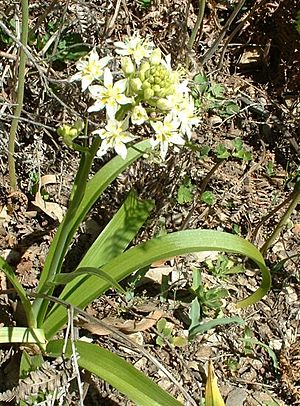Toxicoscordion fremontii facts for kids
- Further information: John C. Frémont botanical nomenclature eponyms
Quick facts for kids Toxicoscordion fremontii |
|
|---|---|
 |
|
| Common star lily | |
| Scientific classification |
|
| Kingdom: | Plantae |
| Clade: | Tracheophytes |
| Clade: | Angiosperms |
| Clade: | Monocots |
| Order: | Liliales |
| Family: | Melanthiaceae |
| Genus: | Toxicoscordion |
| Species: |
T. fremontii
|
| Binomial name | |
| Toxicoscordion fremontii (Torr.) Rydb.
|
|
| Script error: The function "autoWithCaption" does not exist. | |
| Synonyms | |
|
|
Script error: No such module "Check for conflicting parameters".
The common star lily (scientific name: Toxicoscordion fremontii) is a beautiful wildflower. It is also known as Frémont's deathcamas. It got this name after John C. Frémont. You might also hear it called the star zigadene. This attractive plant grows in sunny, open areas. It likes grassy or woody slopes. It also grows on rocky outcrops. You can find it in many lower parts of California, southwestern Oregon, and northern Baja California.
What it Looks Like
The common star lily grows from a round bulb. This bulb is usually about 2 to 3.5 centimeters wide. Its leaves grow from the bottom of the plant. They can be up to half a meter long. But usually, they are shorter, about half that length.
The flowers of the common star lily are very pretty. They bloom from March to June. They grow in clusters, meaning many flowers together. Each flower has six parts that look like petals. Three are true petals, and three are similar sepals. They are arranged in a star shape. This is why it is called the "star lily." Each flower is about 1 to 4 centimeters across.
Where it Grows
This wildflower loves certain types of places. It grows well in lower-lying areas. You can find it on slopes that have grass or trees. It also likes rocky spots. It is common in many parts of California. It also grows in the southwestern part of Oregon. And you can see it in northern Baja California.
Important Note
Like other plants called "deathcamases," this plant is poisonous. It grows from a bulb, which can look a bit like an onion. However, it is very important not to eat any part of this plant. Always be careful around wild plants. Never eat a plant unless an adult who knows plants well says it is safe.
See also
 In Spanish: Toxicoscordion fremontii para niños
In Spanish: Toxicoscordion fremontii para niños
 | Leon Lynch |
 | Milton P. Webster |
 | Ferdinand Smith |

